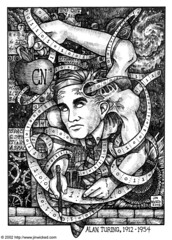what is technology?
I've been rereading about Alan Turing, one of the inventors of the idea of the computer, and Douglas Hofstadter's Godel, Escher, Bach. It's slow going because sadly, I've neglected my maths over the years.
This relates to the old discussion / biases about technology. Some people see technology as reactionary, eg. The Greens, Braverman, Theodore Roszak, Michael Apple. Others see it as neutral, just a tool that can be used for good or bad. I see technology as having a life and evolution of its own, its own internal dynamic. We are co-evolving with technology.
To ask, "Is technology progressive?" is equivalent to asking, "Are humans progressive?" My answer is "yes" but it's the wrong question to start with.
I think we can say that humans are technology. I've long been aware of an essay by Engels (1876), The Part Played by Labour in the Transition from Ape to Man, which argues that the hand preceded and in turn assisted the evolution of the human brain.
Alan Turing's concept of the universal computer is saying the same thing from another direction. Humans are technology.
Part of this thought was triggered by a recent essay by Jeremy Price, Technology as Trickster, where he rejects both the ideas of technology as neutral and the McLuhan idea of "techno-zen environment/ecology" (technology as just a medium). Jeremy draw his metaphor by imaginatively cross fertilising from a book by Lewis Hyde, Trickster Makes This World, linking Hyde's observations about human behaviour to machine behaviour. Jeremy's conclusion:
This relates to the old discussion / biases about technology. Some people see technology as reactionary, eg. The Greens, Braverman, Theodore Roszak, Michael Apple. Others see it as neutral, just a tool that can be used for good or bad. I see technology as having a life and evolution of its own, its own internal dynamic. We are co-evolving with technology.
To ask, "Is technology progressive?" is equivalent to asking, "Are humans progressive?" My answer is "yes" but it's the wrong question to start with.
I think we can say that humans are technology. I've long been aware of an essay by Engels (1876), The Part Played by Labour in the Transition from Ape to Man, which argues that the hand preceded and in turn assisted the evolution of the human brain.
Alan Turing's concept of the universal computer is saying the same thing from another direction. Humans are technology.
" ... there is really only one kind of computer, or, more precisely, that all kinds of computers are alike in what they can and cannot do .... whether its' built of transistors, sticks and strings, or neurons ... making a computer think like a brain is just a matter of programming it correctly."My point is that you have to ask the more fundamental, structural question, "What is technology?" first in order to answer the sociologists question, "Is technology progressive?" The latter question is the wrong question because it immediately encourages people to separate humans from technology whereas in reality we are just two different variants of an evolutionary process.
- W. Daniel Hillis, The Pattern on the Stone, p. ix
Part of this thought was triggered by a recent essay by Jeremy Price, Technology as Trickster, where he rejects both the ideas of technology as neutral and the McLuhan idea of "techno-zen environment/ecology" (technology as just a medium). Jeremy draw his metaphor by imaginatively cross fertilising from a book by Lewis Hyde, Trickster Makes This World, linking Hyde's observations about human behaviour to machine behaviour. Jeremy's conclusion:
The idea of technology as neutral, as a hammer or screwdriver to do with as we please, sits uncomfortably with me. The strict Canadian-McLuhan ideal of a techno-zen environment/ecology ("technology exists") similarly does not work for me, for while I like the idea in theory, I cannot get away from my American bias towards the idea of "progress." In my mind, the idea of Technology as Trickster allows for progress but not in a way that is our own design; try as we might to deny it, technology still has agency. Technology may not have a "human consciousness" (I think we're still working on a definition of that one), but it is something to be engaged with -- not to be controlled. Technology may not be aware of the upheaval it engenders, but we can be, and part of our engagement with technology is an acceptance of change and a vision for making the best of complexity in order to improve ourselves and others.





1 Comments:
Bill,
You might beinterested in Erik Davis' exploration of role of myth and magic in the development technology in his book Techgnosis.
Davis examines how myth and ideas of magic have been central to the invention and development of technology using examples electricity through to modern ICT. It is a fascinating and florid book that although it clearly reveals Davis' own techno-utopian and subcultural passions (his recent work has been on the Burning Man Festival), closely examines the constant relationship of technology and science with religion/spirituality - both organised and organic. And that even though we no longer see electricity as 'magic' that still imbue technology with spiritual associations and understandings (cf. net utopianism etc).
Post a Comment
<< Home